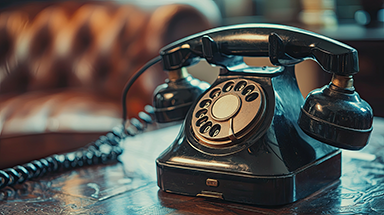
CEO, Tennessee Electric Cooperative Association
It might sound strange to say this, but I’m going to miss the wrong number. No, I don’t mean your worthless losing ticket from the latest Powerball jackpot nor the many mistakes I made in math class. In this case, it started with errant text messages that had been reaching me for a couple of years.
It seems quaint to think about it now, but do you remember how the phone ringing at home used to be somewhat exciting? Perhaps it was a distant family member who waited until after dinner time, when they knew you’d be at home and available to answer. If the call came during dinner, it must have been urgent.
A co-worker of mine recently shared the amazing story of his grandparents and how they operated the local telephone exchange — from their own home. If you were one of the 35 subscribers to phone service in Danville, Alabama, in the early 1940s, Mr. and Mrs. Jim Sandlin likely routed your call from one number to another by manually connecting cables in their dining room.
A lot has changed since then. When the cellphone became more prevalent, the phone call became a bit less special. And now that everyone you know carries a phone with them everywhere they go, the phone call has become one of the least preferred ways to communicate. A whole generation of young people commonly and genuinely fear talking on the phone.
Sometimes those phone calls at home weren t all that special, though. Wrong numbers, an occasional cold call from a salesman or even a prank call or two would find their way to your home.
Around two years ago on Christmas Day, I got a text message from a person I had met through work many years earlier. I hadn’t been in touch with them in a very long time, so I was surprised to see myself included in a large group message. I didn’t recognize any of the other numbers. It was a simple greeting and a photo of the person’s ongoing celebration. As the other replies and greetings came in, I began to realize this was a family to which I had mistakenly been added.
It was the modern-day equivalent of a wrong number. Back then I would have politely told the caller, “I am sorry, but you have dialed the wrong number.” Instead, I chose to ignore the messages and assume the sender would soon realize I was not the Mike she intended to include.
I didn’t think much of it until Easter, when I had the privilege of seeing the grandchildren’s seersucker suits and egg hunt bounty. Beautiful photos of fireworks came during July, along with various birthday greetings and well wishes throughout the rest of the year. The before- and after-game reflections on Georgia football were some of my favorites.
After nearly two years, my status as a false member of this nice family was finally realized, and the messages stopped. There was a great debate in my own house about finally responding in some humorous manner, but I assume this grandmother probably heard a joke or two from the rest of her family who had been wondering about the strange number included in their family messages.
Unlike the wrong number calls of old, I wasn’t annoyed or frustrated by the texts. I even missed seeing them at Christmas. But it does cause me to think: Just because communication has become easy and plentiful, doesn’t mean it is meaningful. A good, old-fashioned phone call is a great way to tell someone you care, get something done or stand out from the crowd. And for the younger folks among us, you might even grow to enjoy it.



